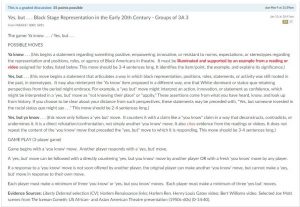4 Chapter 5: Games for Online Engagement

Dennis Beck, Ph.D. School of Theatre and Dance
Problems: Engaging students online and helping them prepare for class activities/discussions
To help students come to class ready to discuss or work with material they have read or viewed meaningfully, I often have them do what I call an Integrative Respo
nse prior to class. Some of these activities are solo and others in small groups, but they all seek to help students put different materials into relationship and get them more deeply. They are meant to help students feel engaged and engage with the material.
Solution: One of the most effective of these responses is a game played in groups of four or five designed to get them thinking about the aspects of and perspectives on an issue or phenomenon. I use it to consider representation of African Americans within performance and its creation, but it could be adjusted for any number of topics. The game contains some of the dynamics of a debate, but one in which each student must consider both sides. It follows a claims and counter-claims structure in which students respond to one another, citing evidence from the assi
gned material.
Students play the game in an online discussion forum, like Canvas discussions. I set the due time for the latest I believe students should offer their first post and inform them of that.

The game: Ya know . . . / Yes, but . . . The Theme: Black Stage Representation in the Early 20th Century
POSSIBLE MOVES
Ya know . . . (this begins a statement regarding something positive, empowering, innovative, or resistant to norms, expectations, or stereotypes regarding the representation and positions, roles, or agency of Black Americans in theatre. It must be illuminated and supported by an example from a reading or video assigned for today, listed below. This move should be 3-4 sentences long. It identifies the item/point, the example, and explains its significance.)
Yes, but . . . (this move begins a statement that articulates a way in which black representation, positions, roles, statements, or activity was still rooted in the past, in stereotypes. It may also reinterpret the ‘Ya know’ item proposed in a different way, one that White-dominant or status-quo-retaining perspectives from the period might embrace. For example, a “yes but” move might interpret an action, innovation, or statement as confidence, which might be interpreted in a ‘yes, but’ move, in language used at the time, as “not knowing their place” or “uppity.” These assertions come from what you have heard, know, and look up from history. If you choose to be clear about your distance from such perspectives, these statements may be preceded with, “Yes, but someone invested in the racial status quo might say . . .” This move should be 2-4 sentences long.)
Yes, but ya know . . . (this move only follows a ‘yes but’ move. It counters it with an assertion like a “you know” claim in a way that deconstructs, contradicts, or undermines the “yes but” move. It is a direct refutation/confrontation, not simply another ‘you know’ move. It also cites evidence from the readings or videos. It does not repeat the content of the ‘you know’ move that preceded the “yes, but” move to which it is responding. This move should be 3-4 sentences long.)
GAME PLAY (4-5-player game)

Game begins with a ‘you know’ move. Another player responds with a ‘yes, but’ move.
A ‘yes, but’ move can be followed with a directly countering ‘yes, but you know’ move by another player OR with a fresh ‘you know’ move by any player.
If a response to a ‘you know’ move is not soon offered by another player, the original player can make another ‘you know’ move, but cannot make a ‘yes, but’ move in response to their own move.
Each player must make a minimum of three ‘you know’ or ‘yes, but you know’ moves. Each player must make a minimum of three ‘yes but’ moves.
Evidence Sources: Liberty Deferred selection (CV); Harlem Renaissance links; Harlem Ren. Henry Louis Gates video; Bert Williams video. Selected Joe Mott scenes from The Iceman Cometh; US African- and Asian American Theatre presentation (1950s-60s) (0-14:40).
I recommend you begin this game on Saturday or Sunday. This game’s DUE time is set so that the latest you can add your first post and not be late is noon the day before class. That is to enable time for exchanges and the development of the game.

